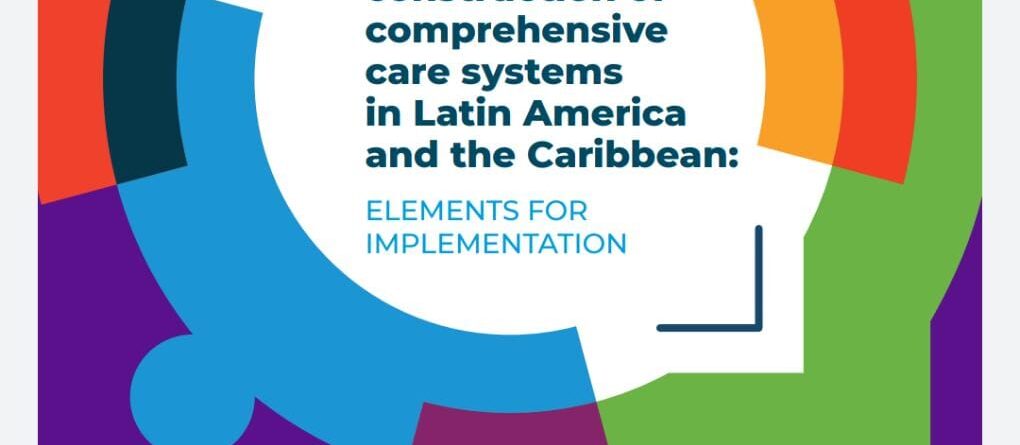Towards construction of comprehensive care systems in Latin America and the Caribbean: ELEMENTS FOR IMPLEMENTATION
By ECLAC
The Latin American and Caribbean region is experiencing an unprecedented economic and social crisis. The effects of the coronavirus disease (COVID-19) pandemic have spread to all spheres of human life, hurting economies, changing the way we interact, and causing extensive societal changes. The crisis has highlighted and exacerbated structural gaps, deepening pre-existing inequalities and exposing the vulnerabilities of political, economic, and social protection systems. The onset of the crisis magnified the structural challenges of gender inequality, reversing much of the progress made in recent decades. In particular, the pandemic has highlighted the vital role that care plays in the functioning of our economies and societies, hence why its current organization is unsustainable and unfair. Owing to the sexual division of labour, care work is highly feminized, whether paid or unpaid. Even before the pandemic, women in the region dedicated three times as much time as men on unpaid care work. This situation was aggravated by a rise in demand for care and a decline in the supply of services caused by the lockdowns and physical distancing measures adopted to curb the crisis. As a result, women have faced even greater barriers to full participation in opportunities for paid work, which has had the added effect of increasing their exclusion from various spheres of public life. Furthermore, in order to balance the care tasks assigned to them and income generating work, women have increased their participation in part-time work and informal economic activities.
The centrality of care has been progressively, albeit unevenly, incorporated into public agendas in the region through the contributions of the feminist economy and years of tireless work by women’s and feminist organizations and movements to draw attention to the key role of societal reorganization of care in shaping more equal and inclusive societies. In the framework of the Regional Conference on Women in Latin America and the Caribbean, which has been meeting for more than 40 years, the member States of ECLAC adopted the Regional Gender Agenda, to safeguard the rights of women, advance their autonomy, and lay the foundations for societies with equality. Over the last 15 years, governments have adopted a number of agreements that are essential for designing and implementing care policies. The agreements reaffirm the principles of universality and progressivity in access to quality care services, the importance of co-responsibility between men and women, and among the State, the market, communities, and families, as well as the importance of promoting the financial sustainability of public care policies aimed at achieving gender equality. In short, the Regional Gender Agenda provides a robust framework of agreements adopted by the governments of Latin America and the Caribbean aimed at guaranteeing women’s human rights, preventing setbacks, and advancing towards women’s autonomy and substantive equality. Several countries in the region have in turn implemented programmes and policies to move towards the recognition, redistribution, and reduction of care work at the national and local levels. These advances have gradually shaped a situation in which care has ceased to be a women’s issue or an issue that can be resolved on its own and is now seen as an issue that society must address, for ethical reasons, and in the interest of justice and survival.
The sixtieth meeting of the Presiding Officers of the Regional Conference on Women in Latin America and the Caribbean was held in February 2021. During the meeting, a special regional consultation session was held, in conjunction with the United Nations Entity for Gender Equality and the Empowerment of Women (UN Women), in preparation for sixty-fifth session of the Commission on the Status of Women. The participating governments discussed the central role of care for a transformative recovery focused on the sustainability of life and the importance of pursuing a regional compact. The initiative was bolstered in the framework of the Generation Equality Forum held in Mexico City from 29–31 March 2021 and in Paris from 30 June–2 July 2021, at which the National Institute for Women of Mexico and UN Women championed the creation of the Global Alliance for Care, a collective multisectoral initiative in which governments, the private sector, international and philanthropic institutions, and civil society organizations can participate and make specific commitments to advancing the care work agenda at the global level. The Alliance, of which ECLAC is a member, seeks to foster, among other things, creation and strengthening of care systems, transformation of gender roles and acceleration of equitable economic recovery in the aftermath of the COVID-19 pandemic, through specific commitments and actions on care.
Given the urgency of the situation, a change in the development model is needed, putting care and sustainability of life at the centre. The creation of comprehensive care systems as a fundamental pillar of social protection entails moving towards a structural and comprehensive proposal that guarantees the rights of people who require care, as well as the rights of caregivers. The creation of comprehensive care systems, in addition to representing progress on rights and a vital achievement in terms of gender equality and the empowerment of women, is also an essential contribution to well-being and a key sector for a transformative recovery with equality and sustainability.
In this regard, UN Women and ECLAC hope that this publication will be a contribution to knowledge and reflection to move forward with implementation of comprehensive care systems and a transition to a care society that prioritizes the sustainability of life, placing it at the centre of policies that support the pursuit of the 2030 Agenda for Sustainable Development.
Read book here











